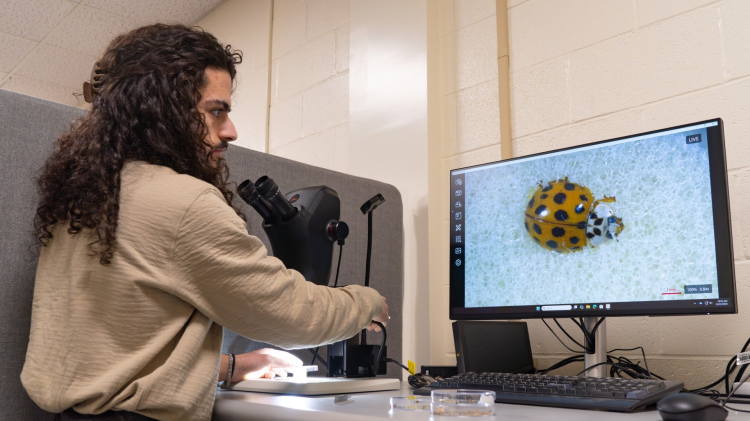Research exploring how ladybugs cope with Nova Scotia's warming winter climate has earned StFX master's biology student Yaseen Ginnab a national scholarship.
Mr. Ginnab, originally from Nashville, Tennessee, was awarded the Dr. Lloyd M. Dosdall Memorial Scholarship, a $1,500 prize from the Entomological Society of Canada recognizing high academic achievement and promising research in arthropod community ecology.

StFX master's biology student Yaseen Ginnab
"It was a great confidence booster for my research, getting that recognition," says Mr. Ginnab, who works in Dr. Jennifer Perry's Insect Evolutionary Ecology Lab. He joined the lab in August 2024, drawn by a long-standing interest in ecology and the effects of climate change on the natural world.
His project focuses on a Nova Scotia native ladybug species that the researchers believe is in decline. His work explores how rising average winter temperatures, and the increasing frequency of short winter heat waves, may be disrupting the insects' ability to survive the cold season.
The goal is to better understand the changing winter climate and what that means for ladybugs and other insects that play key roles in the ecosystem.
"As climate change continues, extreme weather events and temperature fluctuations are increasing in both intensity and frequency. As a result, many insects face severe population declines and risk of extinction," he says.
Mr. Ginnab notes it's very important to have a healthy insect population.
"These organisms represent most of the animal biodiversity and biomass on earth, decompose dead matter, and pollinate most flowering plants. Because they provide these essential functions and more, most ecosystems depend on the health and stability of insect populations. It is therefore critical to understand how climate change affects their physiology and reproduction."
Winters have been warming more than any other season, he notes, yet there is still a big gap in research on this impact on insects. They want to understand what specifically is happening in a Nova Scotia winter.
Because ladybugs are part of the beetle group, the largest group of insect species, changes observed in ladybugs could signal broader impacts for beetles as a whole.
Dr. Perry says she is so pleased that Mr. Ginnab has received this recognition. "His masters research is exploring how ladybugs cope with warming winters. This is an especially important issue in the Maritimes, where winters are warming faster than anywhere else in Canada. Many insect populations are declining in Nova Scotia and beyond, and this research will help us understand the impact of these unusually mild winters," she notes. "I'm very grateful to the Entomological Society of Canada for providing this fantastic support for Yaseen's research."
Using incubators in the lab, Mr. Ginnab simulates winter, spring, and summer conditions to study how the insects respond. Of particular note is how they use oxygen during winter dormancy. Ladybugs do not eat during the winter and rely on stored energy. Warmer temperatures could force them to use those reserves too quickly, raising the risk of mortality.
The Dosdall Memorial Scholarship supports students conducting research in arthropod community ecology, including biodiversity and interactions among plants, herbivores, and their natural enemies. The award recognizes documented scholastic excellence, sustained research achievement, and a clear commitment to the field.
Mr. Ginnab says there are several reasons he is studying entomology. As a young scientist and environmentalist, he says he is concerned about the effects of Anthropocene, or human-caused changes in the environment. Through his career, he wants to investigate the effects of climate change and how we can respond and manage it.













